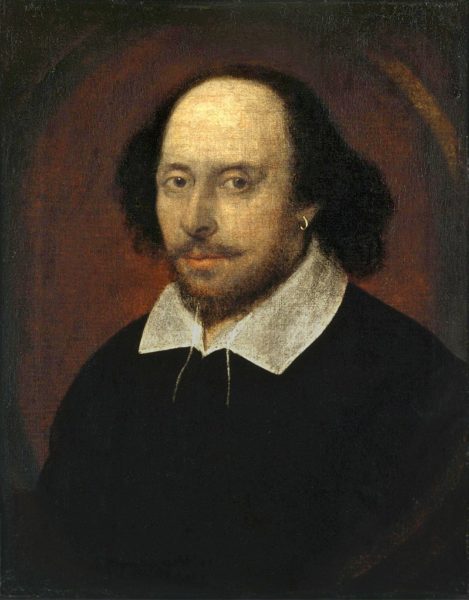Mere mortals might be tempted to answer “Well, Shakespeare, duh!”, but to the dedicated conspiracist, the obvious is never the right answer:

This was long thought to be the only portrait of William Shakespeare that had any claim to have been painted from life, until another possible life portrait, the Cobbe portrait, was revealed in 2009. The portrait is known as the “Chandos portrait” after a previous owner, James Brydges, 1st Duke of Chandos. It was the first portrait to be acquired by the National Portrait Gallery in 1856. The artist may be by a painter called John Taylor who was an important member of the Painter-Stainers’ Company.
National Portrait Gallery image via Wikimedia Commons.
Was Shakespeare a fraud? The American writer Jodi Picoult seems to think so. Her latest novel By Any Other Name is based on the premise that William Shakespeare was not the real author of his plays. Specifically, in her story, the poet Emilia Lanier (née Bassano) pays Shakespeare for the use of his name so that she might see her work staged at a time when female playwrights were extremely rare.
The theory that Shakespeare was a woman isn’t original to Picoult. As with all conspiracy theories relating to the bard, the “true” Shakespeare is identified as one of the upper echelons of society (although not an aristocrat, Lanier was part of the minor gentry thanks to her father’s appointment as court musician to Queen Elizabeth I). Those known as “anti-Stratfordians” – i.e., those who believe that the man from Stratford-upon-Avon called William Shakespeare did not write the plays attributed to him – invariably favour candidates who had direct connections to the court. The general feeling seems to be that a middle-class lad from a remote country town could not possibly have created such compelling depictions of lords, ladies, kings and queens.
[…]
The notion that the actor Shakespeare could have hired out his identity to Lanier, or anyone else for that matter, makes no sense if one considers the collaborative nature of the theatrical medium. Shakespeare was the house playwright for the Lord Chamberlain’s Men (the company that became the King’s Men on the accession of James I). His job was to oversee productions, to write on the hoof, to adapt existing scripts in the process of rehearsal. (This is probably why his later plays such as Henry VIII contain so many stage directions; at this point he was almost certainly residing in Stratford-upon-Avon, and so was not available to provide the necessary detail in person.) It was never simply a matter of Shakespeare dropping off his latest script at The Globe and quickly scarpering. If he was being fed the lines, it is implausible that nobody in the company would have noticed.
[…]
The theory that Shakespeare’s contemporaries – fans and critics alike – would all collude in an elaborate deception requires a full explanation. The burden of proof is very much on the anti-Stratfordians, but proof doesn’t appear to be their priority. They seem to think they know more about Shakespeare than those who actually lived and worked with him. It’s oddly hubristic.
All of this nonsense began with the Baconian theory propounded by James Wilmot in 1785 and has never gone away. The candidates are usually university educated and aristocratic: Francis Bacon, Christopher Marlowe, the Earl of Rutland, the Earl of Oxford – even Queen Elizabeth I has been proposed. The anti-Stratfordian position seems to be based on a combination of class snobbery and presentism. They assume that the middle-class son of a glover who did not attend university could not have developed the range of knowledge needed to inform his plays. They forgot, or do not know, that the grammar school education of the time would have provided a firm grounding in the classics. Shakespeare would have been steeped in Ovid, Cicero, Plautus, Terence, and much more besides. Let’s not forget that Ben Jonson, the most scholarly of all his contemporaries, didn’t go to university either.
Moreover, the plays make clear that Shakespeare was a voracious reader. The idea that one must have direct experience in order to write about a subject is very much in keeping with the obsessions of our time, particularly the notion of “lived experience” and how writers ought to “stay in their lane”.
As I’ve joked in the past, I believe the theory that Homer didn’t actually write The Iliad and The Odyssey … it was another Greek chap of the same name.




Can’t have been a bint. Must have been a tranny.
Comment by MBlanc46 — June 1, 2024 @ 18:15